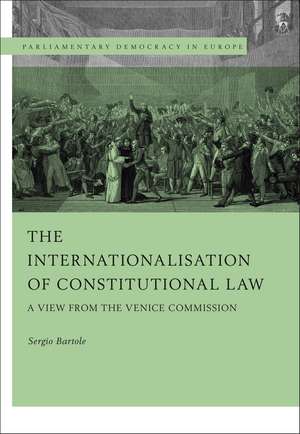The Internationalisation of Constitutional Law: A View from the Venice Commission: Parliamentary Democracy in Europe
Autor Professor Sergio Bartoleen Limba Engleză Paperback – 29 iun 2022
| Toate formatele și edițiile | Preț | Express |
|---|---|---|
| Paperback (1) | 248.70 lei 6-8 săpt. | |
| Bloomsbury Publishing – 29 iun 2022 | 248.70 lei 6-8 săpt. | |
| Hardback (1) | 509.38 lei 6-8 săpt. | |
| Bloomsbury Publishing – 23 dec 2020 | 509.38 lei 6-8 săpt. |
Preț: 248.70 lei
Preț vechi: 321.54 lei
-23% Nou
47.59€ • 49.79$ • 39.53£
Carte tipărită la comandă
Livrare economică 03-17 aprilie
Specificații
ISBN-10: 1509942637
Pagini: 150
Dimensiuni: 169 x 244 x 14 mm
Greutate: 0.25 kg
Editura: Bloomsbury Publishing
Colecția Hart Publishing
Seria Parliamentary Democracy in Europe
Locul publicării:London, United Kingdom
Caracteristici
Notă biografică
Sergio Bartole is Professor of Constitutional Law at the University of Trieste.
Cuprins
Introduction 1. The Development of the Role of the Venice Commission I. The Transition to Democracy and Rule of Law in Central and Eastern Europe II. The Take-Off of the Activity of the Venice Commission III. Rule of Law and Separation of Powers IV. Forms of Government V. Judicial Review 2. European Conditionality, Living Constitution and Constitutional Drafting I. The Many Faces of Conditionality II. From the Council of Europe to the EU - The Living Constitution III. Accession of New Member States to the EU IV. Post-Accession Conditionality and Compliance V. Constitutional and Legislative Drafting 3. The European Constitutional Heritage as a Yardstick for the New Democracies I. The Research of a Parameter II. Paradoxes and History of the Concept of the European Constitutional Heritage III. Comparing Western and Eastern Europe Traditions IV. The Impact of the Western Tradition 4. The Epiphany of the International Constitutional Law I. Constitutionalism and International Law II. International Law, Transnational Law and National Law III. The Making of International Constitutional Law: The Role of the Venice Commission IV. Precedents and Examples5. International Constitutional Law: Sources and Materials I. International Law and Transnational Law II. The Research of the Historical Roots III. The Dubious Contribution of the Central and Eastern European CountriesIV. Conclusions 6. The Venice Commission's Contribution to the Internationalisation of Constitutional Law Regarding States' Judicial Organisation I. Introduction: The Separation of Powers and Its Implementation II. Judicial Councils and Other Solutions III. The Functions of Judicial Councils IV. Budgetary and Financial Matters V. The Prosecution Service VI. Crises and Difficulties of the Mediterranean Model VII. Corruption, Miscarriages and Vetting Procedures VIII. Conclusions 7. Constitutional Justice in the Frame of the Rule of Law I. Setting the Scene II. Institutional Position and Composition of Constitutional Courts III. Jurisdiction and Functions IV. Effects of the Decisions of the Constitutional Courts V. Tensions between Constitutional Courts and Other Branches of the State VI. Constitutional Justice, Rule of Law and Dialogue between the Courts 8. Conclusions and Perspectives I. The Conclusions of the Research II. Tensions in the European Union and Symptoms of Backsliding III. The Reaction of the European Judges IV. International Constitutional Law: Principles, Norms or Standards? V. European or Universal Perspectives? Appendix 1: Monitoring Committee and Venice Commission: 27 Years of Growing Interaction Appendix 2: Comparative Constitutional Law - An Indispensable Tool for the Creation of Transnational Law
Descriere
In this book one of the longest-standing members of The Venice Commission reflects on the work of the institution to show how constitutional law in Europe (and beyond) has become increasingly borderless. Over nine chapters, the book tracks the work of the Commission, illustrating the law both in action and in its broader political and historical context. It looks at its treatment of the judiciary and judicial conflicts, including the present crisis of the rule of law in Central Eastern Europe Member States of the European Union. Finally it suggests how all this can only be sensibly understood as a feature of the broader trend towards the internationalisation of constitutional law.









